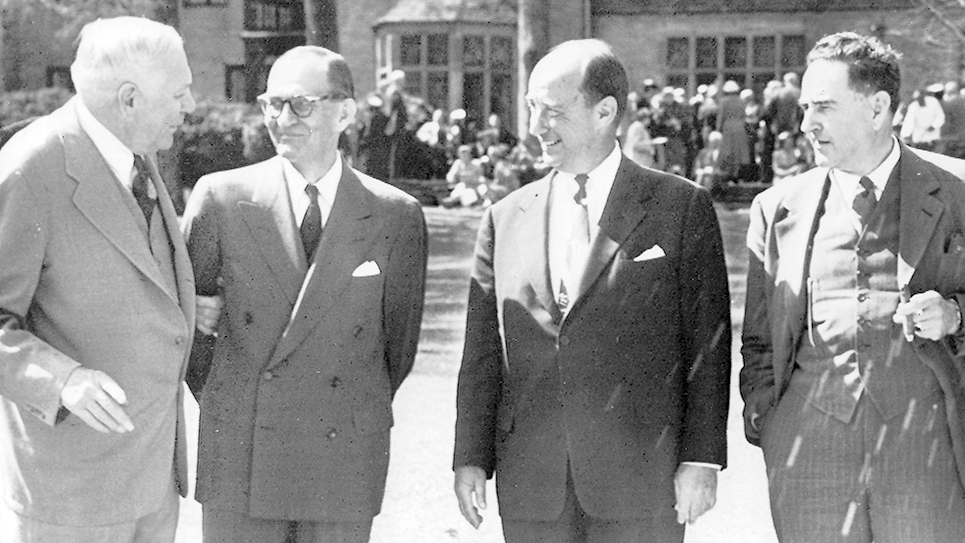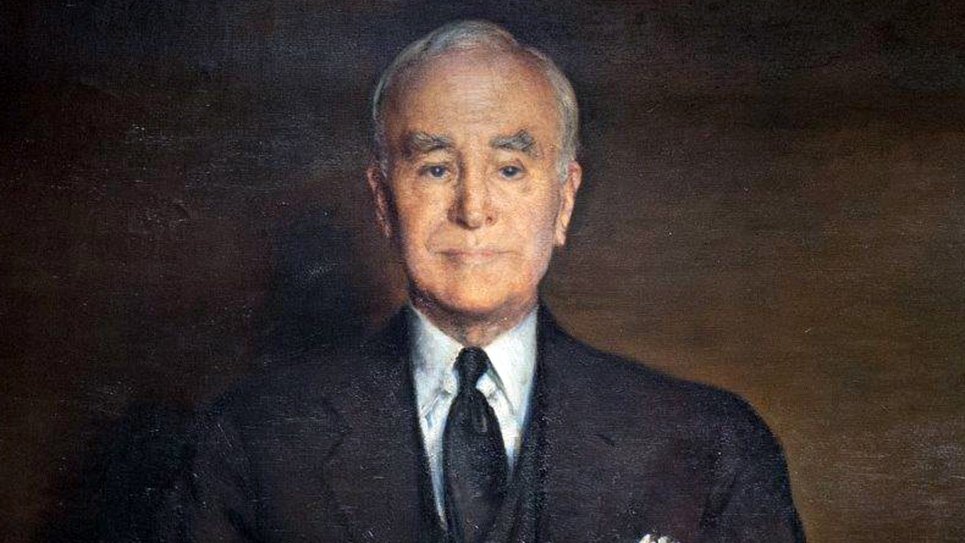William B. Umstead of North Carolina
Like Cameron Morrison and Clyde R. Hoey before him, William Bradley Umstead served as a congressman, U.S. senator and governor of North Carolina. Although both his time in the United States Senate and as governor were abbreviated, many North Carolina historians rank Umstead as one of the Tarheel State’s great governors. William B. Umstead was not at all theatrical; quite the opposite. Umstead looked like a smalltown businessman with his horn-rimmed glasses and neat appearance. Umstead was the first person from Durham to serve as governor of North Carolina. Umstead was a man of inflexible rectitude, one who was “a great deal more interested in fighting fair than in winning.” Umstead was credited with knowing “as much about the mind and heart of North Carolina as any man of his time.”
William B. Umstead taught history for a year before volunteering for the First World War by joining the Army. Rising to the rank of Lieutenant, Bill Umstead fought in France where he served with the 317th Machine Gun Battalion. Like so many of his contemporaries, Umstead attended law school at Trinity College (the forerunner of Duke University). Umstead’s first elected office was as solicitor (district attorney general) for five counties surrounding Durham from 1927-1933. In 1932, Umstead ran for a seat in the U.S. House of Representatives. Umstead faced six opponents in the Democratic primary, including one who had the same last name as him. The candidacy of J. N. Umstead was likely intended to siphon off votes from Bill Umstead, who won the primary anyway. Umstead beat GOP candidate William Ward handily, winning better than 67% of the ballots cast.
Umstead went to Washington where he served during the first one hundred days of FDR’s New Deal. As a member of Congress, Umstead quietly tended to his duties and took care of the folks back home. When he faced a persistent opponent in the 1934 primary, Bill Umstead won the Democratic primary overwhelmingly, carrying all four of the counties comprising North Carolina’s Sixth Congressional District by huge majorities. Congressman Umstead beat his Republican opponent with 69% of the vote.
After once again dispatching two opponents who had run in the 1932 Democratic primary, William B. Umstead was easily renominated and reelected in 1936, one of the best election years for the Democratic Party in history. Umstead surprised some when he announced in February of 1938 that he would not be a candidate for Congress again that year. Umstead said he intended to return home to Durham and resume the practice of law. Umstead had been one of the steady and reliable Democrats in the House and had been rewarded with a seat on the powerful Appropriations Committee, where he chaired a subcommittee on Naval Affairs, a plum assignment for a coastal state like North Carolina. According to press reports of the time, Umstead had given the bulk of his friends and supporters no warning of his impending retirement from the House of Representatives.
While Bill Umstead did go home and take up his law practice once again, he did not completely divorce himself from politics. Umstead served as chairman of North Carolina’s Democratic Party.
Josiah W. Bailey had toppled a political giant when he defeated Senator Furnifold McLendel Simmons inside the 1930 Democratic primary. Simmons had been the head of the most potent political organization in the Tarheel State for quite nearly thirty years. Simmons had refused to support the Democratic presidential nominee, Governor Al Smith of New York, in 1928 and North Carolina had voted for Republican Herbert Hoover. Democrats did not forgive Senator Simmons and replaced him with Bailey in 1930. Bailey was a conservative Democrat and led a coalition of more conservative Democrats and Republicans in the United States Senate. By 1946, Josiah W. Bailey was seriously ailing.
Senator Bailey was at his home in Raleigh where he was recovering from increasingly debilitating heart disease. The senator still commented on issues facing the Senate while at home. Bailey suddenly became ill in the afternoon of Saturday, December 15, 1946, before lapsing into a coma. Relatives were shocked, as they had noted Senator Bailey had been especially cheerful and had been planning a business meeting. The senator died the same day of a cerebral hemorrhage. As is always the case when a member of the U.S. Senate dies, speculation about a successor began as soon as the incumbent’s heart stopped beating. Much of that speculation fell onto the narrow shoulders of William B. Umstead who had managed Gregg Cherry’s campaign for governor in 1944. Umstead had only recently resigned his position as chairman of North Carolina’s Democratic Party. Umstead had resigned as he was planning to run for governor in 1948.
Two days after Senator Josiah W. Bailey’s death, Governor R. Gregg Cherry announced he had appointed William B. Umstead to fill the vacancy until the 1948 election. Perhaps 24 hours after Senator Bailey’s funeral, reporters were ushered into Governor Cherry’s office for a press conference. The reporters were given a mimeographed type-written statement announcing Umstead’s appointment to the United States Senate. In accepting the appointment, which came with no strings or obligations, Bill Umstead realized he would face a formidable and popular opponent in the 1948 Democratic primary. J. Melville Broughton had left office in 1945 as governor of North Carolina and had been running for the United States Senate ever since. Wisely, Broughton had not sought to move from the governor’s mansion to Washington, D.C., by challenging his predecessor Clyde R. Hoey, who was running for the Senate in 1944. Hoey remained even more personally popular than Broughton. The former governor, calculating Senator Bailey was too ill to seek reelection, had his sights set firmly on 1948.
Melville Broughton had already made it clear to financial backers and supporters that he was a certain candidate for the U.S. Senate. Broughton had anticipated his opponent was likely to be whomever Governor Cherry appointed to the Senate and made the press aware that Umstead’s appointment had not altered his plans to run at all. Broughton and Cherry were, if not political enemies, not at all close. Some North Carolina journalists wrote of the Broughton-Cherry “feud,” but perhaps a better description was a mutual antipathy on the part of both men. Broughton groused that Cherry, then chairman of the Democratic Party in the Tarheel State, had not supported his candidacy in 1940. As governor, Broughton had forced Cherry’s resignation and was silent during the 1944 campaign. Only days before the primary election, an angry Governor Melville Broughton finally broke his silence and endorsed Cherry, but that was only because Cherry’s opponent had made suggestions of corruption in the Broughton administration.
Bill Umstead was hardly unknown in North Carolina and had many thousands of friends due to his service in Congress and as chairman of the Democratic Party in North Carolina. Umstead concentrated on his work in Washington and kept in touch with the folks back home. Virtually nobody thought the senatorial battle between William B. Umstead and J. Melville Broughton would be anything but hard fought and close. Umstead also understood North Carolina politics as well as anyone in the state, having managed Cherry’s 1944 gubernatorial campaign. Senator Umstead knew who the powers were in each of North Carolina’s one hundred counties. Gregg Cherry had likely appointed the strongest contender in William B. Umstead to face former governor Broughton. What had once been thought to be a foregone conclusion had become the hardest political fight of Melville Broughton’s political career.
The only saving grace for Broughton was the fact he had begun the race early and had secured commitments from powerful Democrats across the state well before Bill Umstead had been appointed to the U.S. Senate. Broughton won the primary contest by less than 24,000 out of almost 400,000 ballots cast. For Melville Broughton, it was a pyrrhic victory. Broughton was sworn into office on December 31, 1948, and served until March 6, 1949, when he died of a heart attack in Washington, D.C., at age 60.
Once again, William B. Umstead was immediately catapulted into the speculation that he would be reappointed to serve in the United States Senate. Having run such a close race against a highly popular former governor, there was little doubt Bill Umstead could hold the seat should Governor W. Kerr Scott appoint him. Umstead was apparently one of the three most likely appointees considered by Governor Scott. Kerr Scott surprised most everyone when he chose Frank Porter Graham, the saintly president of the University of North Carolina, to serve until the 1950 election.
William B. Umstead had yet again returned back home to Durham and resumed his law practice, but he was not done with politics. He focused upon his longtime goal of running for governor. Umstead announced his candidacy for governor in 1952 and faced Hubert E. Olive, a prominent jurist and attorney and one of the leading Baptist laymen of the Tarheel State. Olive had a commanding presence in the courtroom, accompanied by a powerful voice making him one of the most sought-after lawyers in the state. Umstead won the primary and general elections.
Once elected governor, Umstead startled some of his supporters with the boldness of his proposed program. Governor Umstead said he wanted a bond issue on behalf of public schools and mental hospitals. The governor expanded the State Highway Department from ten to fifteen divisions because it would bring the agency closer to the people it served. Umstead was still insistent he desired “more taxpayers, not more taxes.”
During his short tenure in office, Governor Umstead appointed successors to both of North Carolina’s seats in the United States Senate. When Senator Willis Smith died, Umstead appointed Alton Lennon to fill the vacancy. Later, when Senator Clyde Hoey died, Umstead appointed Sam Ervin to serve in the Senate.
Two days after his inaugural address, Governor William B. Umstead suffered a serious heart attack, complicated by severe congestion in his chest, which verged on a case of pneumonia. Rushed to Watts Hospital in Raleigh on January 10, 1953, Umstead did not return to the governor’s office until May 21st of that year.
The wonder of Umstead’s administrations is that he accomplished so much in not only such a short time, but also because he spent most of the 1953 legislative session in bed. The governor governed from his bed. The Greensboro News and Record noted Umstead “was forced to forego many of the nonessentials of the governorship which a convivial state enjoys but which tax the health of a chief executive.” Umstead was absent from the routine meet and greet opportunities governors traditionally enjoy throughout their time in office.
Governor Umstead was hospitalized once again in 1954, remaining in the hospital for three weeks before returning to the State Capitol. The governor caught cold, which was severe enough to send Umstead back to the hospital. The cold failed to respond to medical treatment and turned into pneumonia. Governor William B. Umstead died of congestive heart failure and pneumonia on November 7, 1954.
The North Carolina Herald-Sun editorialized Umstead had made a conscious decision to ignore his precarious health to do his duty. The people of North Carolina had elected him as their governor, and he gave it all he had. The newspaper noted the governor’s “frail appearance” caused concern amongst those who worked with him, as well as citizens who observed him. The Herald-Sun remembered William Umstead as one who had “earned our admiration and respect long before he reached high public office.” The newspaper editorial summarized perhaps that quality which had caused the people of North Carolina to gift him every important office they had to bestow. “There was a consistency in Mr. Umstead’s life that people could count on, and behind the exterior that sometimes seemed stern there was a natural simplicity and sweetness of disposition.” The Herald-Sun recalled Umstead was incapable of surrendering a principle for the sake of political expediency.
Former Governor Gregg Cherry wrote Umstead was “a man of impeccable character” who was “a man among men.”
© 2024 Ray Hill







